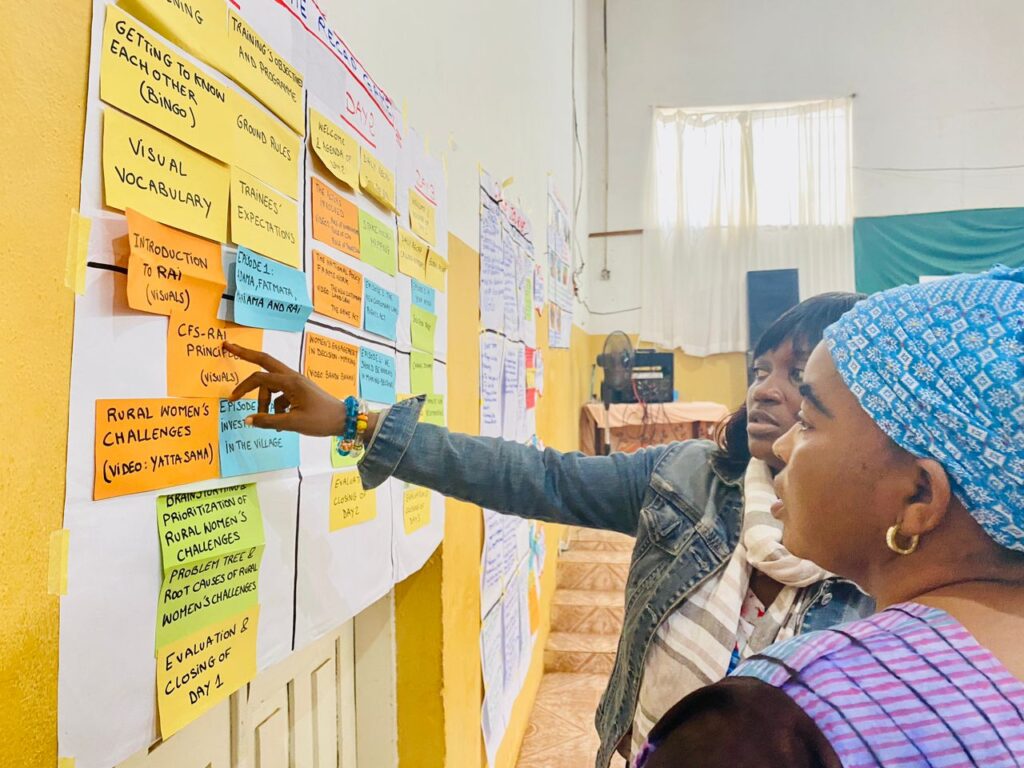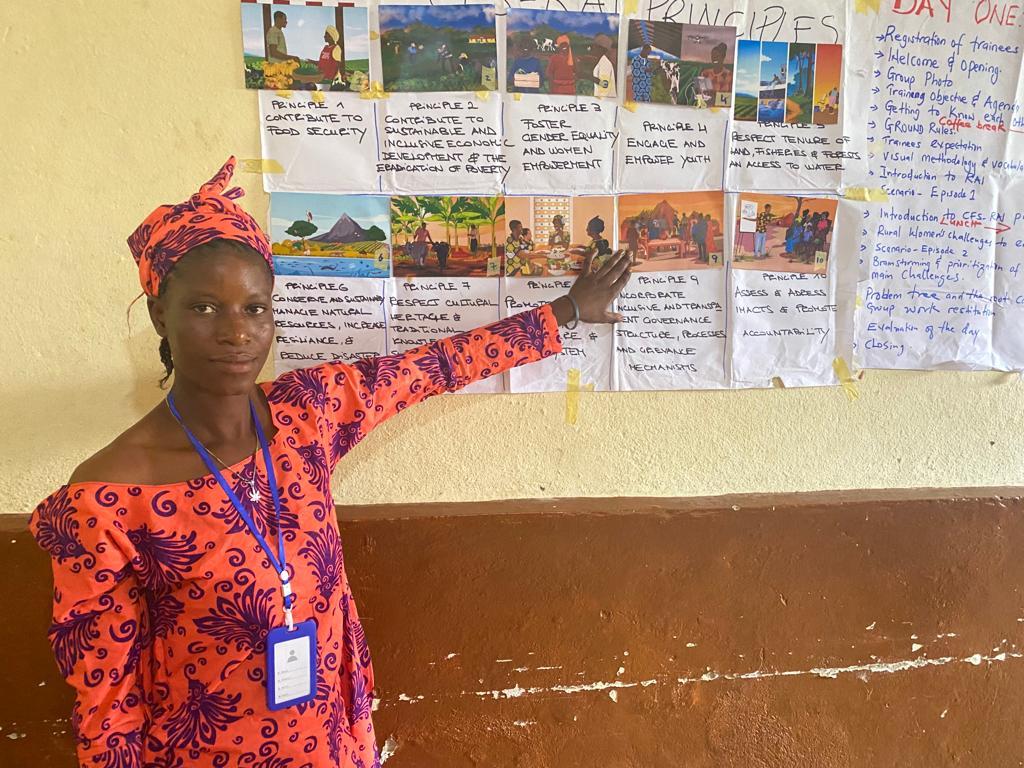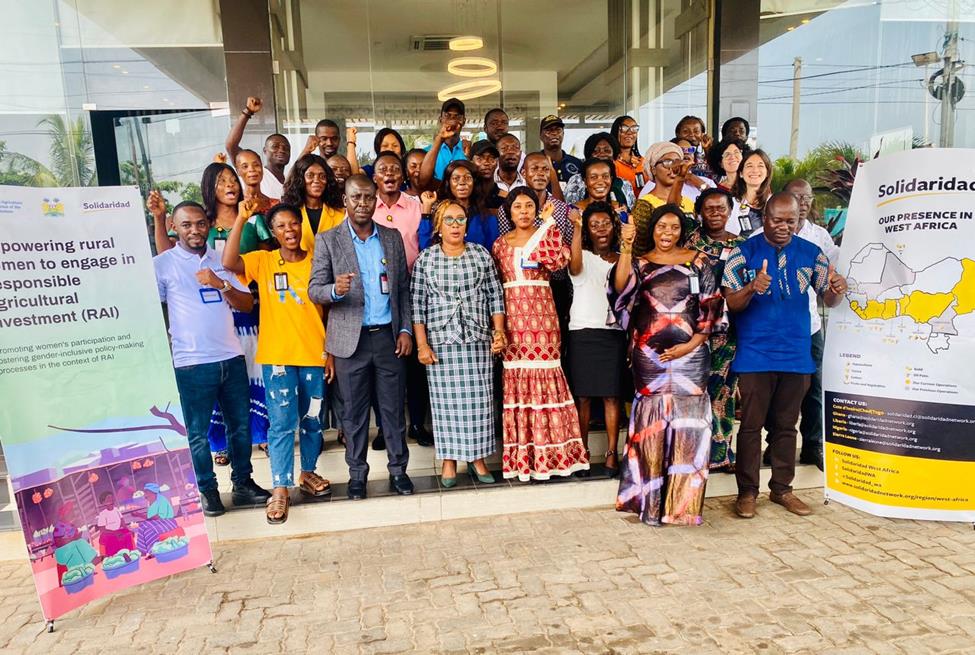Solidaridad supports women in the Responsible Agricultural Investment programme in Sierra Leone.
Studies indicate that rural women comprise 70% of the agricultural labor force in Sierra Leone. However, they are often disadvantaged, and compared with their male counterparts, women do not benefit as much from their agricultural opportunities. This inequality depends on factors that include gender biases which hamper women’s access to resources and services, as well as gender discrimination that is prevalent in the labor market, plus a widespread need to implement effective gender-sensitive policies by the government.
These are tough challenges. In an effort to meet them, Solidaridad and the Food and Agricultural Organization (FAO) have launched the second phase of a capacity-building programme targeting rural women. This project, implemented by Solidaridad, is funded by the FAO as part of their Responsible Agricultural Investment and Food Systems (RAI) initiative.
Building on the work from the project’s first phase, the new programme takes a collaborative approach to empower rural women in Sierra Leone. To improve their lives, these women recognize the need to actively participate in the policy-making and decision-making process at both the national and local level.
The participation by rural women in the project, especially those working in agriculture, is essential as the new programme looks to ensure responsible investment in agriculture and food systems. Through training efforts and dialogue with local stakeholders, the programme plans to reduce poverty, enhance food security and nutrition, while fostering sustainable development. Solidaridad knows that the success of the project depends on committed and involved rural women in order to complete Sierra Leone’s Sustainable Development Goals.
In our partnership with Solidaridad, we are actively supporting the implementation of key initiatives outlined in a roadmap aimed at empowering rural women in responsible agriculture and enhancing their participation in decision-making processes.
Saeed Abubakar Bancie, Country Representative of FAO in Sierra Leone
Adopting a two-pronged strategy for a wider reach
To ensure inclusivity and sustainability, the programme partners adopted a two-tier approach to the training in Sierra Leone. First, a Training of Trainers (ToT) workshop brought together representatives from community-based organizations and civil societies across the five districts in Sierra Leone which will benefit from the program.
The representatives attended seminars on advocacy and outreach, and while participating in the training they reviewed important national policies and laws, including the Women’s Empowerment Act and the new Customary Land Right Act of 2022. Finally, they explored other national policies in Sierra Leone that provide for equal land access and ownership rights for both men and women, along with strategies to encourage active participation in decision-making processes related to responsible agriculture.
In this new project’s second stage, the trained representatives have already returned to their districts to share information with women who are local leaders in farm groups and community-based organizations. Solidaridad’s goal is to enroll 30 new representatives in each district to learn about government programs, ways to participate in policy decision-making, and the power of advocacy; it has kicked off its recruiting effort with outreach and training sessions in the Kambia and Moyamba districts.

Andrew Kojo Morrison, the Country Representative of Solidaridad in Sierra Leone, indicated that the intervention is designed to create a platform for women to articulate their challenges, express their needs, and put forth proposals concerning agricultural investments. As he says, “This marks the initial step in empowering women to actively engage in responsible agricultural investments at the district level.”
Our ultimate goal is for these women to be equipped to influence the processes and policies within their communities once they’ve completed their capacity training.
Andrew Kojo Morrison, Solidaridad Country Representative in Sierra Leone
In the early stages of the project the participating women in the programme have already engaged representatives from the local council, tribal heads, the Ministry of Agriculture and Forestry, the Sierra Leone Investment and Export Promotion Agency, financial institutions, civil society and farmer groups.
Training through different communication channels for impact
To foster engaging and participatory training sessions, Solidaridad and FAO have created a diverse range of educational materials while employing a wide variety of communication channels. The innovative training also uses audio-visual programming and dramatic presentations, including popular theater techniques. The training aims to enhance participants’ comprehension of its various components, with a specific focus on national policy frameworks that relate to women’s right to access land and invest in agriculture.
Memeunatu Queen Bangura, leader of Queen Poultry, a group of women farmers in the Kambia district and a training participant in Kambia, was grateful for the new opportunities presented during the training.
The training has empowered us, as women farmers, to effectively engage with stakeholders to discuss our challenges so that they can be addressed.
Memeunatu Queen Bangura
Bringing all stakeholders on board
For her part, the Deputy Minister of Agriculture, Teresa Dick, appreciates Solidaridad and FAO for their work to change the lives of rural women, especially those women working in agriculture, who face myriad challenges in their daily lives.
The participating partners continue to believe that the Responsible Agricultural Investment and Food Systems (RAI) programme, implemented by the FAO and in collaboration with Solidaridad, will reduce poverty, enhance food security and nutrition, while fostering sustainable development in Sierra Leone.
Read more about our work with women in Sierra Leone on FAO’s website.


